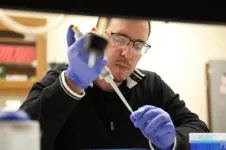(Press-News.org) Is it possible to identify infants more likely to be on the autism spectrum through telehealth assessments? The UC Davis MIND Institute’s Meagan Talbott, a professional researcher in the Department of Psychiatry and Behavioral Sciences, has received a $3.2 million grant to seek the answer to that question. The five-year grant is from the National Institute of Child Health and Human Development.
Talbott is now recruiting for a national study of 120 infants, 6-12 months of age, who are showing delays or differences in their development. Parents might have questions about autism or other conditions, but not necessarily.
“Right now, we don’t have very good tools to tell us whether these differences might be related to autism, developmental delays or are likely to resolve on their own,” she explained. “This means that many families are told to ‘wait and see.’”
She notes that often, families wait months or even years for specialized evaluations, leaving them in limbo and without resources.
“We hope that by closely following many infants with these kinds of early concerns or questions we can help identify when early behavioral differences indicate that a child may be more or less likely to have certain outcomes. This will help us develop better supports for families during this early period before they may have received a specific formal diagnosis,” Talbott said.
How the study will work
Talbott’s team will do a series of four hour-long telehealth assessments over the course of a year with each family, and an additional assessment when the child is 3 years old. The first four sessions will involve activities like playing with toys, peek-a-boo, bubbles, tickles and reading a book. The researchers will also ask caregivers questions to learn more about the child’s development. The final assessment will include different activities geared to the toddler’s age, as well as questions about life skills like potty training, getting dressed and eating on their own.
“Understanding what, if any, factors predict these developmental skills will help us provide better feedback and supports for families in the future,” Talbott said.
Talbott’s team will mail families a small kit of toys and other materials and can offer families an iPad to use, if needed. They’ll also schedule a 15-minute practice session and ask families to fill out questionnaires about the child’s development.
All families will receive written reports summarizing each telehealth visit, as well as $50 for each infant visit and $100 for the final toddler visit.
Researchers will track what kinds of support parents prefer to use for the telehealth sessions and caregiver satisfaction with the study. They’ll ask for feedback after each session to ensure the methods are working well.
Telehealth may help overcome challenges faced by previous autism studies
In the past, it has been challenging to recruit enough infants with early behavioral differences near a research site to answer developmental questions through traditional in-person studies. Because of this, most studies of early development in autism have focused on the younger siblings of autistic children, who are more likely to develop autism than other children.
Although about 20% of these siblings will be identified as autistic by the time they are 3 years old, Talbott points out that very few show clear behavioral differences in the first year of life from infants who are not later diagnosed as autistic.
“Unfortunately, we still know very little about the outcomes of infants who have early behavioral differences,” Talbott explained. “Telehealth offers the opportunity to reach more families with early questions or concerns, so that we can learn more about when these early developmental differences are likely to resolve and when they indicate a child is more likely to be on the autism spectrum. This can help us connect families with the right services sooner.”
One challenge the research team faces is that families may not be sure whether their child is experiencing delays in their development or may not know what questions to ask their doctor. That’s why Talbott aims to include families who have both very specific concern and those who may be unsure. The researchers will complete a developmental screening as part of the study and families can share that information with their pediatrician or other provider.
How to sign up for the study
Talbott’s team is recruiting infants 6-12 months of age whose caregivers have specific or general concerns or questions about their development, including social communication or language skills.
Infants should be able to sit up with help and hold toys.
Call 916-848-7670 or email HS-tedistudy@ucdavis.edu
Funding
In addition to the funding from the National Institute of Child Health and Human Development, the project was supported by the National Center for Advancing Translational Sciences, National Institutes of Health (NIH) grant UL1 TR001860 and linked award KL2 TR001859, and NIH grant 5KL2TR001859-07, and the MIND Institute Intellectual and Developmental Disabilities Research Center, funded by NIH grant P50HD103526.
Related Resources
Study website
MIND Institute Research Participant Registry (This database matches potential participants with research studies)
Study suggests telehealth screening of some infants could aid in early autism support
END
Can telehealth assessments identify infants more likely to be on the autism spectrum?
$3.2 million federal grant will fund national study that could lead to earlier intervention, better access to care
2023-12-13
ELSE PRESS RELEASES FROM THIS DATE:
Virginia Tech researcher probes the potential for preventing and reversing age-related memory loss
2023-12-13
About 40 percent of people over age 65 suffer some form of age-related memory loss, which puts them at higher risk for developing dementia and Alzheimer’s disease. However, there are currently no approved methods for preventing memory loss with age.
Tim Jarome, associate professor of neurobiology in the Virginia Tech College of Agriculture and Life Sciences’ School of Animal Sciences is hoping to change that, aided by a $433,000 grant from the National Institute on Aging, which is part of the National Institutes of Health.
Jarome and his research partner, Assistant Professor Sydney Trask of Purdue University’s Department ...
Mpox (monkeypox) vaccine triggers equally strong immune response in smaller than usual doses and in people with or without HIV
2023-12-13
Delivering the two-dose mpox vaccine, called JYNNEOS, in smaller than the usual FDA-approved doses, and by injection between layers of the skin rather than by the standard route under the skin, produced a detectable immune response, a new study shows. This also occurred regardless of whether people were living with or without HIV.
Led by researchers at NYU Grossman School of Medicine, the study showed no significant difference in the strength of the immune response (as gauged by the amount of detectable IgG antibodies, immune proteins that help kill the mpox virus) between most of those who received their vaccine injections in small doses ...
Interactive screen use reduces sleep time in kids, researchers find
2023-12-13
UNIVERSITY PARK, Pa. — While screen time is generally known to affect sleep, new research suggests that interactive engagement, such as texting friends or playing video games, delays and reduces the time spent asleep to a greater extent than passive screen time, like watching television — especially for teens.
The research, which published today (Dec. 13) in the Journal of Adolescent Health, demonstrates that adolescents at age 15 who used screens to communicate with friends or play video games in the hour before bed took 30 minutes longer to fall asleep than if they had refrained from interactive screen time. But it wasn’t just interactive screen time ...
New study shows exercise can boost brain health
2023-12-13
Santa Monica, Calif. (Dec. 12, 2023) – A fascinating link between regular exercise and better brain health has been revealed, according to an international study that included a team of clinical researchers from Pacific Neuroscience Institute’s Brain Health Center, located at Providence Saint John’s Health Center.
The research, detailed in the paper "Exercise-Related Physical Activity Relates to Brain Volumes in 10,125 Individuals," was published this week in the Journal of Alzheimer’s Disease and shows being physically active is related to increased size of brain areas important ...
UNC researchers reveal prevalence of persistent symptoms in patients with microscopic colitis
2023-12-13
It’s a hidden cause of diarrhea and the development of the disease is poorly understood. Multiple factors work against the diagnosis of microscopic colitis, an inflammatory digestive disease, because the symptom distress compared to patients with other causes of chronic diarrhea remains unknown. Now, a new study published in journal Gastro Hep Advances, shows patients may be unsure of a diagnosis based on their colonoscopy results, patients may not be prescribed the proper medications, and many patients may remain symptomatic one year after colonoscopy.
The ...
Don't say vegan: Americans more likely to choose vegan food if labeled ‘healthy’ and ‘sustainable’
2023-12-13
There may be a simple way to convince meat eaters to consume vegan food, according to a new USC study: Don’t call the food “vegan.”
Americans were far less likely to choose a gourmet gift basket without meat or dairy if it was labeled “vegan” or “plant-based,” according to a nationally representative survey of more than 7,500 U.S. adults. By contrast, labeling the basket “healthy” and/or “sustainable” roughly doubled the likelihood that Americans ...
UTA’s Woods and Weidanz named to NAI
2023-12-13
The National Academy of Inventors (NAI) has elected Jon Weidanz and Robert Woods, two professors from The University of Texas at Arlington, as fellows.
Weidanz is vice president for research and innovation and holds research positions in bioengineering and kinesiology. He also is a member of the Bone and Muscle Research Center and the Multi-Professional Center for Health Informatics at UTA.
Woods is a professor of mechanical and aerospace engineering, the advisor of the Formula Society of Automotive Engineering (FSAE) student racing team and the holder of the Dr. Bob Woods Chair in Automotive Engineering Endowed by Paul Andrews ...
Breastfeeding alters infant gut in ways that boost brain development, may improve test scores
2023-12-13
Breastfeeding, even partially alongside formula feeding, changes the chemical makeup—or metabolome—of an infant’s gut in ways that positively influence brain development and may boost test scores years later, suggests new CU Boulder research.
“For those who struggle with exclusively breastfeeding, this study suggests your baby can still get significant benefits if you breastfeed as much as you can,” said senior author Tanya Alderete, an assistant professor of integrative physiology at CU Boulder.
The study, published Dec. 13 in the journal npj Metabolic Health and Disease, also identifies specific ...
Scientists identify a key cause of female infertility
2023-12-13
Infertility affects around 48 million couples worldwide and can have various causes. In mammals, including humans, eggs are produced in the ovary. When this process goes wrong, it can lead to female infertility. One example of this is premature ovarian insufficiency, which is characterised by problems with egg production before the age of 40. Up to 3.7% of females experience infertility as a result of this condition, and around 30% of cases are due to genetic variations. Professor Kehkooi Kee, from Tsinghua University, China, who helped ...
Very irregular sleep linked to higher risk of dementia
2023-12-13
EMBARGOED FOR RELEASE UNTIL 4 P.M. ET,WEDNESDAY, DECEMBER 13, 2023
MINNEAPOLIS – People who have very irregular sleep patterns may have a higher risk of dementia than those who have more regular sleep patterns, according to new research published in the December 13, 2023, online issue of Neurology®, the medical journal of the American Academy of Neurology. The study does not prove that sleep irregularity causes dementia. It only shows an association.
Sleep regularity is how consistent you are at going to sleep and waking up at the same time each day.
“Sleep health recommendations often focus on getting the recommended ...
LAST 30 PRESS RELEASES:
Ultrasound AI receives FDA De Novo clearance for delivery date AI technology
Amino acid residue-driven nanoparticle targeting of protein cavities beyond size complementarity
New AI algorithm enables scientific monitoring of "blue tears"
Insufficient sleep among US adolescents across behavioral risk groups
Long COVID and recovery among US adults
Trends in poverty and birth outcomes in the US
Heterogeneity of treatment effects of GLP-1 RAs for weight loss in adults
Within-person association between daily screen use and sleep in youth
Low-dose lithium for mild cognitive impairment
Catheter ablation and oral anticoagulation for secondary stroke prevention in atrial fibrillation
A new theory of brain development
Pilot clinical trial suggests low dose lithium may slow verbal memory decline
Bioprinting muscle that knows how to align its cells just as in the human body
A hair-thin fiber can read the chemistry of a single drop of body fluid
SwRI develops magnetostrictive probe for safer, more cost-effective storage tank inspections
National report supports measurement innovation to aid commercial fusion energy and enable new plasma technologies
Mount Sinai, Uniformed Services University join forces to predict and prevent diseases before they start
Science of fitting in: Do best friends or popular peers shape teen behavior?
USF study: Gag grouper are overfished in the Gulf; this new tool could help
New study from Jeonbuk National University finds current climate pledges may miss Paris targets
Theoretical principles of band structure manipulation in strongly correlated insulators with spin and charge perturbations
A CNIC study shows that the heart can be protected during chemotherapy without reducing antitumor efficacy
Mayo Clinic study finds single dose of non-prescribed Adderall raises blood pressure and heart rate in healthy young adults
Engineered immune cells show promise against brain metastases in preclinical study
Improved EV battery technology will outmatch degradation from climate change
AI cancer tools risk “shortcut learning” rather than detecting true biology
Painless skin patch offers new way to monitor immune health
Children with poor oral health more often develop cardiovascular disease as adults
GLP-1 drugs associated with reduced need for emergency care for migraine
New knowledge on heritability paves the way for better treatment of people with chronic inflammatory bowel disease
[Press-News.org] Can telehealth assessments identify infants more likely to be on the autism spectrum?$3.2 million federal grant will fund national study that could lead to earlier intervention, better access to care



